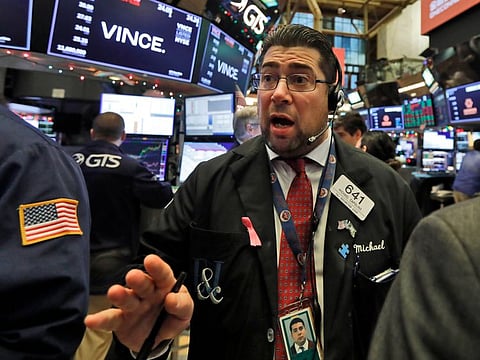China markets in focus this week as virus outbreak haunts
Analysts warn of economic fallout if factories remain closed, market sell-off deepens

Dubai: Worries about an escalating virus outbreak are further seen hurting China markets as they reopen after a weeklong closure.
In China, where the virus originated before spreading to about 20 other countries, mainland-listed stocks are primed for a steep fall on Monday when stock markets in Shanghai and Shenzhen resume trading after closing for the Chinese new year holidays.
The benchmark Shanghai index had fallen 4.5 per cent since mid-January as virus concerns heightened and the number of deaths spiked.
We still hope the economic and market disruption will prove temporary. But, given China’s prominent position in global supply chains and some financial assets’ stretched valuations, there could be global economic fallout if factory closures are extended further and the market sell-off deepens.Simon MacAdam, Global Economist at Capital Economics
Investors will closely watch how severe the sell-off in China will be on Monday.
After an extended break last May, the Shanghai index fell 5.6 per cent as investors reacted to escalating trade tensions with the US — a sell-off that wiped out almost half a trillion dollars from Chinese equity values.
China GDP hit
With the death toll passing 300, and more than 14,000 infections confirmed, the extensive efforts to contain the coronavirus will cause GDP growth in China and emerging Asia to slow sharply in the first quarter, said Simon MacAdam, Global Economist at Capital Economics.
“We still hope the economic and market disruption will prove temporary,” MacAdam added. “But, given China’s prominent position in global supply chains and some financial assets’ stretched valuations, there could be global economic fallout if factory closures are extended further and the market sell-off deepens.”
Hong Kong stocks faced the brunt of the sell-off seen in Asia stock markets last week, by plunging nearly 6 per cent.
Wall Street turns red
The top indices on Wall Street declined on Friday, wiping out all the earlier gains in January for the S&P 500, with the index down about 0.2 per cent on the month. The Dow Jones Industrial Average has turned also red for January, down 1 per cent. The stock sell-off deepened on the last day of January on concerns that the deadly coronavirus will disrupt the global economy.
“Uncertainty is never great for stocks, but when it involves the lives of many, many people, it’s impossible to know just what kind of problems this uncertainty will eventually create,” Matt Maley, chief market strategist at Miller Tabak, wrote in a note.
More earnings
Another possible driver for markets in the week ahead, includes the January US jobs report on Friday, which comes as worries grow that the economy was already weakening even without the impact of the virus. Another rush of corporate earnings reports are expected this week, including Google’s parent firm Alphabet and Disney.
Alphabet’s earnings report comes after a mixed earnings season so far for large tech stocks. Shares of Apple and Amazon rose after their reports, but Facebook’s stock fell as the social media company’s costs rose.
UAE mirrors global sentiment
In the UAE, Dubai’s top index was down 1.1 per cent during the week, while the index in Abu Dhabi fell 1.6 per cent.
The sell-off continued on Sunday, with the DFM index closing down 0.86 per cent and the ADX index shedding 0.8 per cent.
In Dubai, Emirates NBD fell 1.5 per cent and blue-chip developer Emaar Properties shed 1 per cent, while in Abu Dhabi United Arab Emirates’ largest lender First Abu Dhabi Bank fell 1 per cent.
Regional investors will eye more corporate earnings in the days ahead, a week after top lenders Emirates NBD, Abu Dhabi Commercial Bank (ADCB) and First Abu Dhabi Bank (FAB) reported their fourth-quarter results. Dubai Islamic Bank, National Bank of Ras Al Khaimah (RAKBANK), Mashreq, Abu Dhabi Islamic Bank and DP World are seen reporting results this week, according to Bloomberg.
Investors remained alarmed over a steep decline in oil prices, with Brent down about 12 per cent in the year so far.
It was on track for a fourth straight weekly loss on mounting worries about economic damage from the coronavirus that has spread from China to around 20 countries.
However, the main index on ADX outperformed the GCC markets in the first month of 2020 by rising 1.58 per cent, followed by the Dubai index which rose 0.92 per cent.
The indices outperformed MSCI Emerging Markets Index, which decreased by 4.69 per cent, with Saudi index the biggest percentage loser with a decrease of 1.7 per cent.






